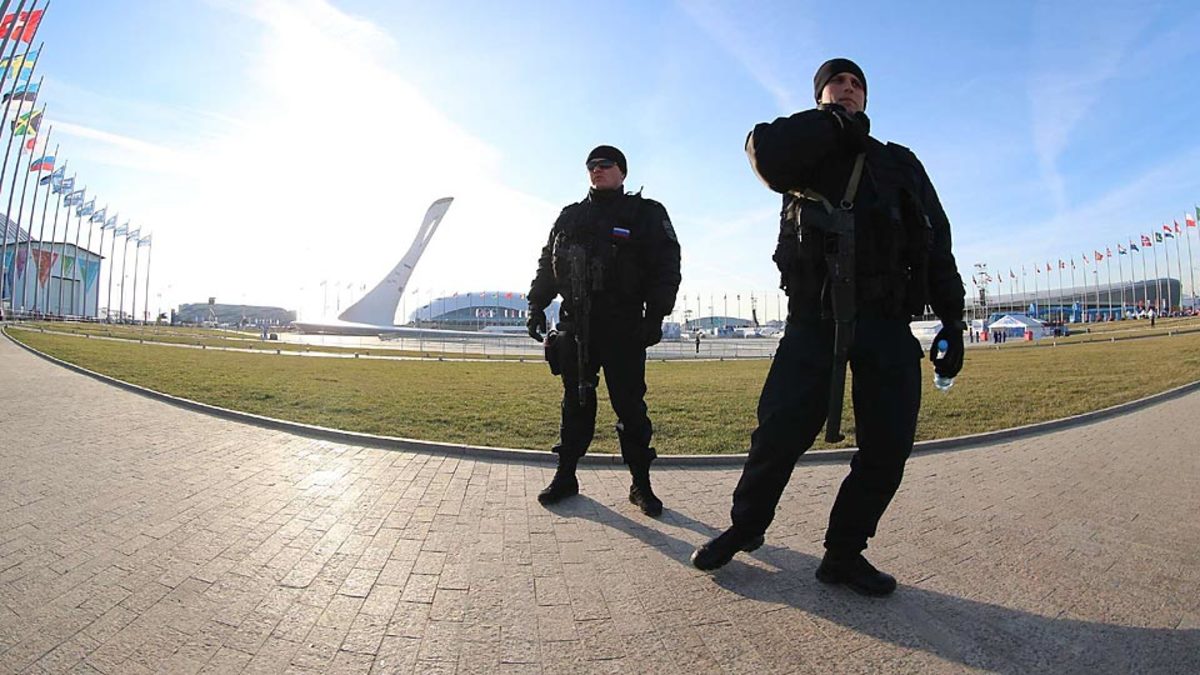Initially concerned, Olympic attendees learn to live with terrorism threat
SOCHI -- Vladimir Putin has promised a Ring of Steel to keep these Olympics safe, but wherever Andrea Davidovich and Evgeni Krasnopolski go, they bring their own little Ring of Steel. You don’t know who Davidovich and Krasnopolski are, but somebody might. That is why guards accompany them to events and sleep in their house.
Davidovich and Krasnopolski are figure skaters representing Israel. In 1972 in Munich, terrorists from a group called Black September hopped the fence surrounding the Olympic Village and killed 11 Israelis. For 42 years, Israeli eyes have scanned international athletic venues, looking for another Black September.
“Every competition, we have extra security,” says Davidovich, who grew up in Vermont. “We take measures that other pairs or other competitors don’t have to take.”
The terrorist threat hovered over Putin’s Games right up until they began. British officials said a terrorist attack was “very likely.” American visitors who signed up for STEP notifications from their State Department were advised to “remain attentive regarding their personal security at all times,” because the Olympics are “an attractive target.”
In a three-month span in 2013, three suicide bombers targeted public transportation in Volgograd, 600 miles from Sochi. There were reports of “black widow” fundamentalist women willing to die so they could kill. My friends asked me if I was scared to go to Russia at least as often as they asked if I was excited to cover the Olympics, and several gifted colleagues chastised the International Olympic Committee for brazenly and recklessly placing the Olympics in the Caucasus.
Then the Olympic flame was lit, and the terrorist talk floated away like a runaway helium balloon. Journalists seem more concerned with broken doorknobs and missing shower curtains. Athletes have not really brought it up, even in vague terms, and are seldom asked.
These Olympics feel as festive, welcoming, delightful and inane as any other. On one evening at Olympic Park, I only saw one person who seemed remotely alarmed, and that was a mother pushing a stroller when the loudspeakers started blasting. The singer on stage sang a medley in which she smoothly transitioned from the Eurythmics’ “Sweet Dreams (Are Made of This)” to the White Stripes’ “Seven Nation Army” for no discernible artistic reason.
Sochi feels safe. This does not mean it is. Anything could happen at any time. But Krasnopolski , who grew up in Israel, understands what visitors here are figuring out: You can live with a threat if you try.
“In Israel, you get used to it after a while,” he said. “Yeah, it’s not nice … but when you grow up on stuff like that, you know what to do, you know where to run if you need to. “
You also learn to see a potential terrorist attack as one of many possible calamities, instead of elevating it above all others. It can be unnerving to walk down a Tel Aviv street and see soldiers wielding weapons, but on the whole, that city boasts a relatively low violent crime rate. Krasnopolski said the crime is “just wars,” which sounds flip, but is the truth. Even with all the political tension, people are arguably safer in Tel Aviv than in many American cities.
When U.S. congressman Peter King said the terrorist threat in Sochi was “very concerning” and visiting as a spectator was “not worth the risk,” he surely had good reasons to do so, just as those British officials did not pull “very likely” out of thin air. But terrorist acts are not like ice storms. You can’t warn people that one is coming tomorrow between 5 and 10 p.m., so they had better stay inside.
There was not much terrorism chatter on the streets of Oklahoma City in the spring of 1995, or New York City on Labor Day weekend, 2001. And of the following Olympics on U.S. soil, which was most likely to be marred by a bombing?
1. Lake Placid in 1980, weeks after U.S. President Jimmy Carter publicly threatened to pull the U.S. out of that summer’s Olympics in Moscow.
2. Los Angeles in 1984, in the midst of an Eastern bloc boycott.
3. Salt Lake City in 2002, sandwiched between the 9/11 terrorist attacks and the U.S. invasion of Iraq.
4. Atlanta in 1996, a year after the Oklahoma City bombing.
Obviously, we know now that Eric Rudolph put a bomb in Atlanta’s Centennial Park, but even in retrospect, there weren’t many signs that Atlanta was vulnerable.
We don’t know if the Ring of Steel is as solid as Putin claims. But if you go to the big souvenir store next to Fisht Olympic Stadium, in the shadow of the flame, you will see a line to get in, not to get out.





